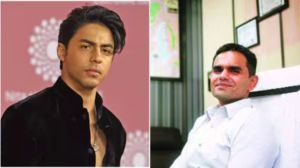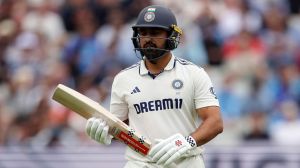Mrs Murty goes to the movies
Shes been an engineer,a mother,an author of over 30 books,a teacher and a philanthropist. As Sudha Murty turns 60,shes far from retirement.
Shes been an engineer,a mother,an author of over 30 books,a teacher and a philanthropist. As Sudha Murty turns 60,shes far from retirement. Instead,the wife of Infosys founder Narayana Murthy tells our correspondenti that she feels she has entered cinema with a bang as she debuts as an actor in a Kannada film
Everybody knows Sudha Murty as the wife of Infosys Technologies co-founder Narayana Murthy. Many know her as a philanthropist (founder-chairperson of Infosys Foundation) and a prolific author too. In July,Sudha Murty will also be known as an actor,when her debut film Prarthane (Prayer) releases across theatres in Karnataka.
Nobody is as tickled by that fact as the lady herself. It is as if I have entered Bollywood with a bang! she chuckles,her face alight with mischief. Her husband,the ever-serious Narayana Murthy teases her. When are you off to Switzerland for a shoot? he asks. Murty says she has become the butt of friends jokes in her new movie-star avatar. They ask,Who is your hero in the film?,and if I dont answer a call,they ask my assistant,Madam shooting-ge hogiddara? (Has madam gone for a shoot?). She says mock-seriously,I hope directors dont start offering me mother-in-law roles now.
Engineer,homemaker,writer,philanthropist,teacher,angel investor and now actor. She is constantly re-inventing herself,who knows what she will do next? muses Rohini Nilekani,wife of Infosys co-founder Nandan Nilekani. Touching 60,Murty has the passion and the intellectual curiosity of a teenager.
Sadashiva Shenoy,the film-critic-turned-director of Prarthane found directing Murty an unusual experience. She agreed to act in Prarthane only if her role required no make-up,gold jewellery,not even a silk sari. She sailed from her office straight to the movie set and played the role of a reality show judge in her trademark cotton sari,jasmine flowers adorning her knotted grey hair.
Facing the camera was the easy part,says Murty of her new occupation. Putting on a stern,emotion-less face was tough, she says. Her character espouses the cause of regional language and culture,a subject dear to her heart. Shenoy says Murtys delivery was flawless. She is a natural, he says.
Murty is in some ways the antithesis of her husband. Murthy rarely smiles,he is an intense,lonely person and an introvert, she says. You know what they say about opposite forces attracting each other. (Murty,nee Kulkarni,insists that Murty is the phonetically-correct spelling of her husbands name and chooses to spell hers that way). While her husband dislikes crowds,Murty is a master storyteller,in her element surrounded by people,regaling them for hours with stories.
Her husband is popular for his management lessons but Murty wins people over instantaneously with her life lessons,recalling some long-lost detail of their past or some tidbit about their families. She is intelligent and interesting,and uses her elephantine memory to devastating impact in social gatherings and conversations, says Nilekani.
Murtys self-portrayal is more modest,turning up sometimes as a character in her own books and novels,some 30 of them,which have been translated into 14 languages including English. In her popular humorous novel,a work of fiction called Samanyaralli asamanyaru (The uncommon amongst commoners) she writes about 18 different characters including a cook and a bus conductor. The characters ring so close to life that her childhood friend who married a bus conductor called up to laughingly demand royalty.
In the book,Murty casts herself as the 19th character,Dabbi Nalini. Contrary to her picky-eater husband,she herself is a terrible cook in real life but a gourmand,a lover of good food. Those who know her often display their affection by packing some home-cooked specialty. Like Dabbi Nalini in the book,I end up with loads of tiffin dabbas at the end of every year,and count them as symbols of love, she says.
She is self-deprecating as she talks about her journeys. While in an Orissa village searching for dying art forms,Murty recalls visiting a fisherman. When he humbly offered her tea,Murty,who avoids tea and coffee,asked for a glass of milk instead. Then,from inside the hut,she overheard the fishermans wife grumble in Oriya,That woman has only a head full of gray hair but no brain inside! If I give her the one glass of goat milk we have,what will our child drink? Murty,who speaks eight languages,decided that day never to ask for milk in a poor persons home.
The simple lives of the Murthy couple,commonly referred to as Infosys billionaires,are much appreciated. But Murty says she grew up under modest circumstances: watching movies in tent cinemas back in the days when Sanskrit was still a spoken language. Her grandfather was a school teacher and her father a doctor. She expected very little in life when she put together Rs 10,000 of her savings to help launch Infosys. Infosys and all that followed was a big bonus to me, she says.
Yet,Murty readily admits that there were moments in her past when she felt twinges of regret. A masters in electrical engineering from the premier Indian Institute of Science,she started her career as a development engineer with Telco.
Murty gave up a career to raise her two children,Akshata and Rohan,even as her husband busied himself building one of Indias most admired companies. I loved the technical stuff so it was hard for me to give up a career the mind accepts but the heart does not, she recalls. Looking back,she says she stayed home to make sure her children imbibed good values respecting good education,respecting elders,cultivating a reading habit,learning ethical values. I weighed my career choices with my children,and my children won, she says.
Her students recall her coming alive when she started teaching computer science at a city college,a vocation that led to a beginners book on computers and the internet. Murty made every lesson interesting by weaving in stories and anecdotes. Teacher and students often went off to matinees (first-day-first-show). She lent her shoulder when they talked of a failed love affair or a bad show in an exam. The bonds built with her students during those days are still strong. Even now,Teachers Day is for my old students, she says. Her husband is perplexed and often asks her,You are happier than me. How? and she responds,I am a small person,my world is small,and I love filling it with people.
It was the Infosys Foundation that changed her life and gave her fulfillment in a way that a career could never have,she says. When she launched the foundation 14 years ago with an annual funding of Rs 20 crore from Infosys Technologies she felt like a mother all over again. Now it is the other way around,Im the child and the foundation my motherit has taught me so much,it has shaped me. As she traverses villages and disaster-struck regions,she says she has begun to understand,what it is to be poor,sick,helpless or a victim of circumstances.
Infosys is in its 29th year of existence and Murtys children too are all grown up. Akshata,an MBA from Stanford University,wed last year and is busy setting up a fashion business in New York. Rohan is finishing his PhD in computer science from Harvard University. But that does not stop the mother from worrying about them. What is hard is the newspapers constantly writing about how much the two are worth,she says. How do they know that the people they are meeting are genuine? When Murthy and I got married,we had understood each other well.
So,she advises them not to judge people by their external appearances and to think hard before making big decisions. Most of the wealth they have is not theirs; most of it will have to go to worthy causes,she tells them. As a lover of history,I know that no kingdom or ruler has lasted beyond 250 years. I tell them,where wealth accumulates,men decay, she says.
At another level,she says,she has become philosophical about things. She says she never dreamed she would be where she is today. I dont know what life has planned for my kids,and there is a limit to the efforts you can put into raising them,I have done my duty,I have that feeling, she says.
Meanwhile,her youngest baby,Infosys Foundation,flourishes with zero overheadsit works out of free rooms provided by Infosys. Its activities,spread from Tamil Nadu to Punjab,are primary education,scholarships for poor students,supply of medical equipment to hospitals,mid-day school meals,revival of dying arts,training of teachers and disaster management. One of its few NGO beneficiaries is Prerana,which rescues runaway children from railway platforms and helps bright,poverty-stricken children with college fees,books and spoken English classes.
In Bangalore,a dharamshala built by the foundation at the governments Kidwai Cancer Institute has become a refuge for relatives of poor cancer patients who earlier slept on the pavement outside. Murtys generosity has supported the revival of dying traditions like the puppet form of Yakshagana in Karnataka and the Pochampalli weaving art in Andhra Pradesh. Over 15,000 school libraries thrive in rural schools. Some 3,000 homes are being built for the flood-affected in Karnataka. In disasters,I look up to the Tatas philanthropic work and follow their example, says Murty whose bare office is adorned by a framed portrait of Jamshedji Tata.
In her own life,Murty says she is cutting back. Her home is the same for the last 21 years,right down to the curtains,crockery and the sofa. She says she feels calmer as she closes in on her 60th birthday. As per the Mahabharata,I should be entering the vanaprashta (retiring from the material world) phase of my life, she says. But going by her enthusiasm,it might be a while before Murty embraces retirement.
Murthy vs Murty
*Sudha Murty loves walking,her husband hates walking or any other form of physical exercise. He only enjoys mental exercise,says his wife.
*She loves visiting historical places on holiday,his idea of a holiday is the Infosys Training Campus in Mysore.
*She enjoys watching movies,she watches a movie a day. Hed rather watch cricket on television.
*She spends her Sundays watching television,going for walks,going grocery shopping or getting a massage. He unwinds by reading physics textbooks,deducing mathematical formulae,taking a siesta and answering hundreds of emails.
*She loves being around people,attends weddings even if she sometimes has to pretend that she is Sudha Murtys cousin,that is why we resemble each other. He feels uncomfortable in a crowd,doesnt attend weddings or other social gatherings.
*She loves to talk,he is a great listener. She says,That works very well for us.
*She likes good food,can never diet. He is a poor eater. He will never comment even if there is no salt in the dish,that is why my cooking never improved.
*She likes the taste of jowar rotis,typical of northern Karnataka where she was born and grew up. He likes bisi bele bath,the rice-and-lentil dish that is trademark of southern Karnataka cuisine.
*Both enjoy listening to music (she likes Indian classical,he likes Western classical) and books (they have a library each).



- 01
- 02
- 03
- 04
- 05




























